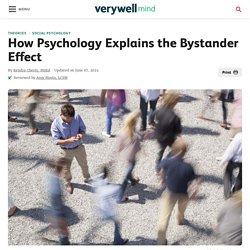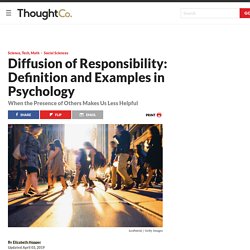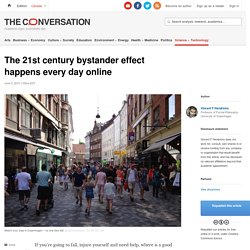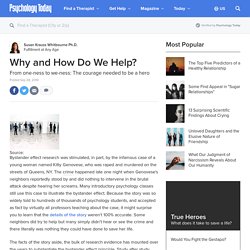

If you have answered yes for the above questions, would you have done the same if there is a crowd around you which you felt that they could have done something too?
This collection will share with you some of the interesting facts about Bystander effect and how to overcome it!
Bystander Effect. What Is the Bystander Effect?
If you witnessed an emergency happening right before your eyes, you would certainly take some sort of action to help the person in trouble, right?

While we might all like to believe that this is true, psychologists suggest that whether or not you intervene might depend upon the number of other witnesses present. The bystander effect - Economic and Social Research Council. Diffusion of Responsibility: Definition and Examples in Psychology. What causes people to intervene and help others?

Psychologists have found that people are sometimes less likely to help out when there are others present, a phenomenon known as the bystander effect. One reason the bystander effect occurs is due to diffusion of responsibility: when others are around who could also help, people may feel less responsible for helping. Key Takeaways: Diffusion of Responsibility Diffusion of responsibility occurs when people feel less responsibility for taking action in a given situation, because there are other people who could also be responsible for taking action.In a famous study on diffusion of responsibility, people were less likely to help someone having a seizure when they believed there were others present who also could have helped.Diffusion of responsibility is especially likely to happen in relatively ambiguous situations.
Bystander effect. Bystander effect, the inhibiting influence of the presence of others on a person’s willingness to help someone in need.

Research has shown that, even in an emergency, a bystander is less likely to extend help when he or she is in the real or imagined presence of others than when he or she is alone. Moreover, the number of others is important, such that more bystanders leads to less assistance, although the impact of each additional bystander has a diminishing impact on helping. Kitty Genovese. The Kitty Genovese murder in Queens, New York, in 1964 is one of the most famous murder cases to come out of New York City and into the national spotlight.

What propelled it wasn’t the crime or the investigation, but the press coverage that alleged the murder had many witnesses who refused to come to the Kitty Genovese’s defense. This has been disproved over time, but not before it became part of the accepted lore of the crime. Kitty Genovese was returning from work home at around 2:30 a.m. on March 13, 1964, when she was approached by a man with a knife. Genovese ran toward her apartment building front door, and the man grabbed her and stabbed her while she screamed. A neighbor, Robert Mozer, yelled out his window, “Let that girl alone!” The Bystander Effect:The Death of Kitty Genovese.
Bibb Latané and John Darley. Are We Victims Of "Bystander Effect"? Everywhere! The 21st century bystander effect happens every day online. If you’re going to fall, injure yourself and need help, where is a good place to do it?

Should you choose a busy thoroughfare or a deserted backstreet? Statistics and experiments in social psychology will tell you that if you need help, you should avoid dropping in a busy street, even if hundreds of people are passing through. This is because of a phenomenon known as the bystander effect. The more individuals gathered in one place, the less chance there is of one of them coming to the aid of a person in need. When an emergency situation occurs, it’s more likely that someone will come to the rescue if there are fewer or almost no witnesses. And in the 21st century, when our thoroughfares are online and on social networks, millions of people are effectively passing each other by every minute.
The presence of other people has long been shown to give rise to confusion about responsibility. The Science of Empathy. You can make someone's day better, or even, save a precious life. Why and How Do We Help? Source: Bystander effect research was stimulated, in part, by the infamous case of a young woman named Kitty Genovese, who was raped and murdered on the streets of Queens, NY.

The crime happened late one night when Genovese's neighbors reportedly stood by and did nothing to intervene in the brutal attack despite hearing her screams. Many introductory psychology classes still use this case to illustrate the bystander effect. Because the story was so widely told to hundreds of thousands of psychology students, and accepted as fact by virtually all professors teaching about the case, it might surprise you to learn that the details of the story weren't 100% accurate. Some neighbors did try to help but many simply didn't hear or see the crime and there literally was nothing they could have done to save her life. article continues after advertisement.
Overcoming the Bystander Effect. BystanderEducation.